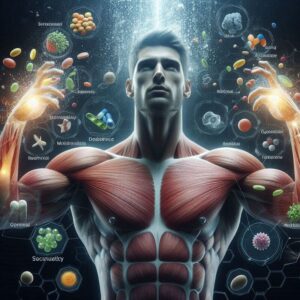Maximize Your Muscle Recovery: Effective Nutritional Strategies for Optimal Performance
To reach your highest potential in muscle recovery, it is crucial to pay close attention to the specific macronutrient ratios within your dietary plan. The three main macronutrients—protein, Carbohydrates, and fats—serve as essential energy sources and are also the fundamental building blocks necessary for maintaining your body's structural integrity and supporting various physiological functions. Each of these macronutrients plays a unique role in the process of muscle repair and regeneration, making it essential for dedicated athletes seeking to enhance their athletic performance to comprehend how these nutrients interact synergistically to facilitate effective recovery processes.
Among these vital macronutrients, protein is particularly critical for muscle recovery due to its rich composition of essential amino acids that are required for effective muscle repair and growth. By consuming an adequate amount of protein after your workouts, you can significantly stimulate muscle protein synthesis, which is the process that leads to the formation of new muscle proteins while simultaneously reducing the breakdown of existing proteins. This intricate balance is pivotal for optimal muscle recovery, allowing for quicker recuperation and adaptation to the stress of training. Additionally, carbohydrates are crucial for restoring glycogen levels that are depleted during vigorous workouts, thereby supplying the energy necessary for future training sessions. Finally, fats play a supportive role by contributing to energy production and hormone regulation, both of which are vital for effective muscle recovery.
To identify the most suitable macronutrient ratio tailored to your muscle recovery needs, a personalized approach is essential. This should factor in individual aspects such as body composition, workout intensity, and unique fitness goals. A common guideline suggests that consuming a combination of protein and carbohydrates within 30 minutes to 2 hours post-exercise can greatly enhance recovery. This timing is crucial as the body enters a heightened state of nutrient absorption, presenting the perfect opportunity to nourish your muscles and foster effective recovery.

Enhance Your Muscle Recovery with Top Protein Sources
Understanding that protein is not merely another component of your diet but a crucial factor in muscle recovery is essential for anyone engaged in physical training. This vital macronutrient supplies the amino acids necessary for muscle repair and growth, making it imperative to incorporate protein-rich foods into your meals to effectively enhance muscle restoration. High-quality animal protein sources, including eggs, dairy products, lean meats, fish, and poultry, provide complete amino acid profiles that are particularly advantageous for muscle regeneration and recovery.
For those who favor plant-based diets or wish to expand their protein sources, there exists a plethora of excellent alternatives. Foods such as lentils, chickpeas, and black beans are not only nutrient-dense but also high in protein, positively contributing to muscle recovery. Additionally, options like tofu, tempeh, edamame, and other soy products serve as fantastic complete protein sources that can be seamlessly integrated into a well-rounded diet aimed at supporting muscle healing.
Moreover, protein supplements like whey, casein, or plant-based powders can prove highly effective in boosting your protein intake specifically for muscle recovery. These supplements offer a convenient method for ensuring you meet your post-workout protein needs, enabling easy incorporation into your favorite smoothies, shakes, or meals, thereby maximizing your recovery potential and supporting your fitness journey.
Restore Energy with Carbohydrates for Enhanced Muscle Recovery
Carbohydrates play a vital role in the muscle recovery process by replenishing glycogen stores that become depleted during intense physical activity. Consuming carbohydrates within the first 30 to 60 minutes after exercising can significantly help in restoring energy levels and accelerating muscle recovery. During rigorous workouts, muscles primarily depend on glycogen as their main energy source, and the body is most efficient in storing glucose immediately post-exercise. Therefore, the timing of carbohydrate intake is critical and can greatly influence muscle glycogen synthesis and overall recovery outcomes.
Incorporating a diverse range of nutrient-dense foods, such as legumes, fruits, and vegetables, which are rich in natural sugars and starches, can substantially bolster your muscle recovery while providing a multitude of health benefits. These foods are typically high in fiber and packed with essential nutrients, supplying a steady release of energy alongside the vitamins and minerals vital for overall health and effective recovery. By prioritizing these complex carbohydrates within your meals, you can make informed dietary choices that significantly cater to your body’s nutritional needs and recovery process.
Proper post-exercise nutrition is an essential aspect of muscle recovery. Combining carbohydrates with protein can substantially enhance muscle glycogen resynthesis and facilitate effective muscular repair. This potent nutrient pairing also stimulates insulin release, which aids in transporting glucose and amino acids into muscle cells, further enhancing recovery and repair mechanisms.

Boost Your Recovery: The Importance of Healthy Fats
While discussions surrounding muscle repair often emphasize protein and carbohydrates, dietary fats are equally essential for a comprehensive recovery strategy and overall health. Healthy fats are critical for hormone production, particularly testosterone, which plays a significant role in both muscle growth and the repair processes that follow physical exertion. Foods rich in omega-3 fatty acids, such as walnuts, flaxseeds, and fatty fish, provide anti-inflammatory benefits that can help mitigate exercise-induced inflammation and expedite muscle recovery. Additionally, these fatty acids are crucial for forming cell membranes necessary for muscle repair.
Incorporating a variety of healthy fat sources, including nuts, seeds, avocados, olive oil, and fatty fish, can yield substantial benefits for your overall health as well as muscle regeneration. These fats not only enhance the flavor of your post-exercise meals or snacks but also provide essential energy while supporting various physiological processes linked to recovery. Explore different healthy fat options and consciously incorporate them into your diet; your muscles will likely respond favorably to this added attention!
While fats are a vital component of a balanced diet, moderation is key. It is crucial to avoid excessive intake of unhealthy fats, such as trans fats and saturated fats, which can increase inflammation and hinder healing and performance. Therefore, achieving the right balance of fats within your diet is essential for optimal muscle recovery and overall health.
Stay Hydrated: The Essential Role of Fluids in Muscle Recovery
One of the most frequently overlooked aspects of muscle recovery is the indispensable role of hydration. During physical activity, our bodies lose fluids through perspiration, and not replenishing these lost fluids can lead to dehydration. This condition can severely impair athletic performance and prolong the time it takes for muscles to recover. Dehydration negatively impacts nutrient transport to muscles, increases the risk of cramping, and may even result in muscle damage, making it vital to prioritize hydration.
Maintaining adequate fluid intake not only supports muscle recovery but also contributes significantly to overall health and well-being. Proper hydration aids in nutrient transport, regulates body temperature, and helps eliminate waste products. Ensuring that you remain well-hydrated both before, during, and after physical activity is crucial for optimizing muscle recovery. While water is the most effective hydration solution, consider incorporating electrolyte-rich beverages such as sports drinks or coconut water to replenish lost electrolytes during intense workouts.
Being attuned to your body’s hydration signals is essential for maximizing recovery. Monitoring indicators such as urine color, changes in body weight, and sensations of thirst can provide valuable insights into your hydration status. This self-awareness can help you maintain optimal fluid intake, thereby promoting maximal muscle repair. Additionally, incorporating more water-rich foods, such as fruits and vegetables, can further enhance your hydration and recovery efforts.

Essential Micronutrients for Accelerating Muscle Recovery
Grasping the importance of micronutrients, which include essential vitamins and minerals, is vital for effective muscle recovery and overall health. These micronutrients should not be considered optional; they are integral components that influence various physiological processes, including exercise performance and recovery. For instance, the antioxidant properties of vitamin C can help reduce the inflammatory and oxidative stress that occurs during physical activity, while vitamin D is crucial for maintaining bone health and supporting muscle function, both of which are essential for recovery.
Key minerals such as iron, magnesium, and zinc play significant roles in energy production, oxygen transport, and muscle function during exercise. To promote optimal muscle repair, it is essential to consume a well-rounded diet rich in fruits, vegetables, whole grains, lean meats, and healthy fats, ensuring you receive these vital micronutrients.
While athletes may consider supplementing with specific micronutrients to address deficiencies or meet the increased demands of rigorous training, it is crucial to seek professional advice. Consulting with a healthcare professional or a certified dietitian before starting any supplementation regimen can ensure both safety and effectiveness, allowing you to feel more informed and confident in your dietary choices.
Ultimately, food plays a pivotal role in muscle recovery following intense physical activity. Achieving the right balance among macronutrients—including protein, carbohydrates, and fats—along with proper hydration and adequate micronutrient intake, is essential for effective muscle regeneration and enhancing athletic performance. By being mindful of your dietary choices and providing your body with the necessary nutrients, you can support quicker healing, minimize the risk of injury, and elevate your overall fitness level.
Common Questions About Muscle Recovery and Nutrition
What key processes are involved in muscle recovery?
Muscle recovery is a complex and multifaceted process through which muscles repair and rebuild after experiencing physical stress, such as exercise or resistance training. This vital process is essential for promoting muscle growth and enhancing overall physical performance, allowing your body to adapt to the demands of training.
How does diet impact muscle recovery outcomes?
Your diet is a fundamental factor affecting muscle recovery, as it provides the essential nutrients required for muscle repair and growth. Achieving the right balance among macronutrients (protein, carbohydrates, and fats) and micronutrients (vitamins and minerals) is crucial for optimizing muscle recovery and improving overall athletic performance.
What dietary strategies are most effective for muscle recovery?
The most effective dietary approach for muscle recovery typically includes a balanced combination of high-quality protein, carbohydrates, and healthy fats. Foods rich in protein, such as lean meats, fish, eggs, and dairy products, are particularly beneficial for supporting muscle repair and growth. Carbohydrates are essential for supplying energy for workouts and replenishing depleted glycogen stores, while healthy fats contribute to overall health and hormone production.
How much protein should I consume to support muscle recovery?
The general recommendation for protein intake aimed at muscle recovery ranges from 1.2 to 2.2 grams of protein per kilogram of body weight per day. This range may vary based on individual factors, including activity level, muscle mass, and specific training objectives.
Are there specific foods that effectively enhance muscle recovery?
Foods that are rich in protein, such as chicken, turkey, salmon, eggs, Greek yogurt, and tofu, are especially effective in aiding muscle recovery. Additionally, incorporating complex carbohydrates from whole grains, fruits, and vegetables, along with healthy fats from avocados, nuts, and olive oil, can further enhance muscle recovery and improve overall athletic performance.
Should I consider supplements to aid my muscle recovery?
While a nutritious and balanced diet can generally provide the essential nutrients necessary for muscle recovery, some individuals may benefit from supplementation with protein powders, branched-chain amino acids (BCAAs), or creatine to support their recovery and performance goals. It is essential to consult with a healthcare professional before introducing any supplements into your diet to ensure safety and effectiveness.
This valuable information is provided by:
Reliable Resources for Muscle Recovery and Nutritional Insights
Nourish Your Hair: Protein Intake and Hair Health. https://www.theproteinfactory.pk/blog/protein-and-hair-health/
The Maximum Calorie Intake to Lose Weight | Woman – The Nest. https://woman.thenest.com/maximum-calorie-intake-lose-weight-17436.html
The Article: Optimal Diet for Muscle Recovery appeared first on Acupuncture Cottam.
The Article Muscle Recovery: The Optimal Diet You Need appeared first on https://mcrtherapies.com
The Article Optimal Diet for Muscle Recovery You Need Was Found On https://limitsofstrategy.com
The Article Muscle Recovery: The Optimal Diet You Need First Appeared ON
: https://ad4sc.com





Comments are closed